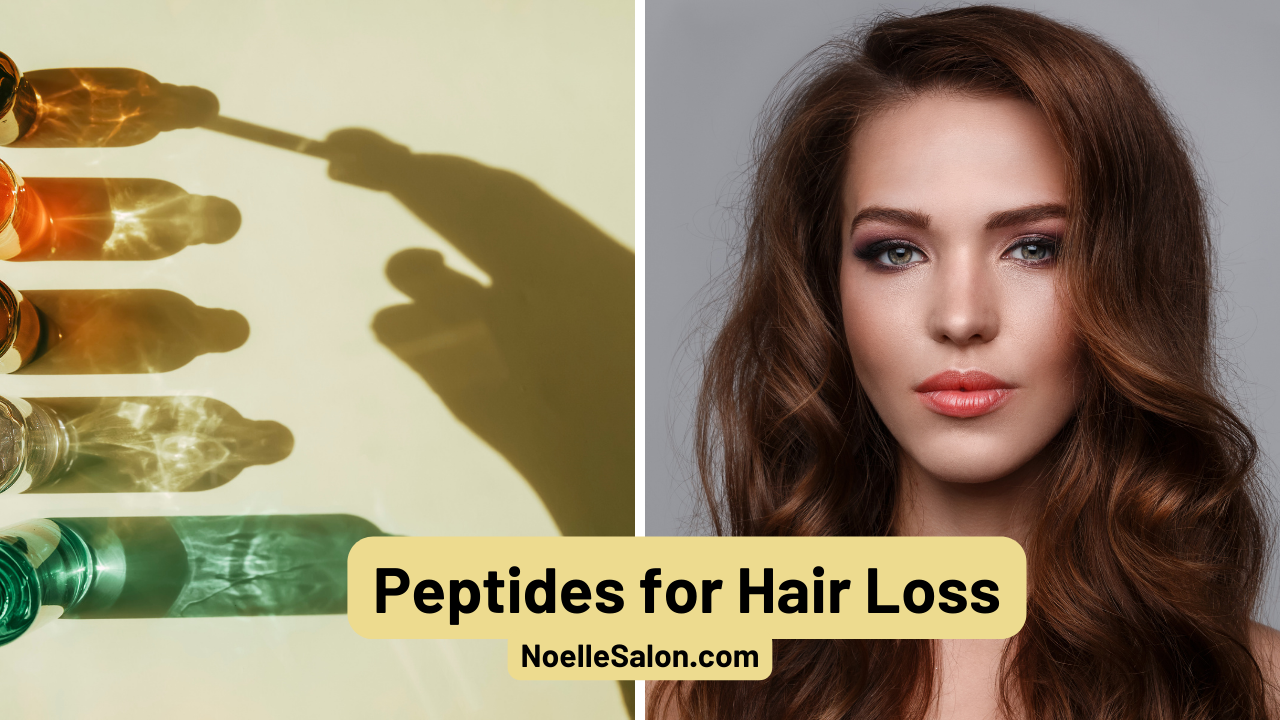Peptides vs. Other Hair Growth Treatments
What are peptides and how do they promote hair growth?
Peptides are short chains of amino acids that play a crucial role in hair growth. They stimulate hair follicles, increase blood flow to the scalp, and promote collagen production for stronger hair strands. This leads to improved hair growth and thickness, making peptides an effective treatment for hair loss.
Peptides for hair loss
Hair loss can be a distressing experience for both men and women. Many people seek solutions to regrow their hair and restore their confidence. While traditional hair growth treatments like minoxidil and finasteride have been widely used, there is a growing interest in peptides as an alternative approach to hair restoration. Peptides, with their unique properties and ability to stimulate hair growth, are becoming increasingly popular in the field of hair regrowth. In this blog, we will explore the role of peptides in hair growth and compare them to other hair growth treatments to understand why peptides have gained attention as a potential solution for hair loss.
Understanding Peptides and Their Role in Hair Growth
To comprehend the efficacy of peptides for hair growth, it is important to understand what peptides are and their role in the hair growth process. Peptides are compounds consisting of amino acids, which are the building blocks of proteins. Hair follicles, responsible for hair growth, greatly benefit from peptides as they promote cell regeneration and collagen production, crucial for healthy hair growth. By enhancing scalp health and improving blood circulation to the hair follicles, peptides play a key role in stimulating new hair growth and combating hair loss.
What are Peptides?
Peptides, in simple terms, are short chains of amino acids, which are the building blocks of proteins. These amino acids, when combined, form peptides, which then play various essential roles in the body. These small, powerful compounds contribute to the formation of collagen and elastin, two key proteins responsible for healthy skin, hair, and nails. In the context of hair growth, peptides are particularly beneficial as they enhance scalp health, stimulate hair follicles, and promote healthy hair growth. By providing the necessary building blocks for hair strands, peptides ensure stronger, healthier hair and combat hair loss.
 Peptides and Hair Growth
Peptides and Hair Growth
Peptides play a vital role in hair growth by targeting various aspects of the hair follicle and growth cycle. Firstly, peptides aid in reducing inflammation and promoting scalp wellness, creating an optimal environment for hair regrowth. They boost hair follicle size and increase blood flow, and oxygen levels, all of which contribute to stronger and healthier hair growth. Additionally, peptides combat free radical damage, which can hinder hair growth, and stimulate new cell growth for hair restoration. By enhancing blood circulation, peptides improve nutrient delivery to hair follicles, stimulating new hair growth and reducing thinning hair. Furthermore, peptides play a crucial role in transitioning hair follicles from the telogen phase (resting phase) to the anagen phase (active growth phase), ensuring a healthy hair growth cycle.
Different Types of Peptides Used for Hair Growth
Peptides used for hair growth come in different types and have unique properties that contribute to hair regrowth. Let's take a closer look at two specific peptides commonly used for hair growth therapy.
Brief on Oligopeptide-2
One of the peptides used for hair growth therapy is Oligopeptide-2. This peptide aids in hair regeneration and improves the health of hair follicles. By promoting cell regeneration and collagen production, Oligopeptide-2 provides the essential building blocks for healthy hair growth. It also combats inflammation, promoting scalp health and increasing hair density. Additionally, Oligopeptide-2 targets free radical damage, a key factor in thinning hair, and stimulates new hair growth. With its ability to enhance blood flow to the hair follicles, Oligopeptide-2 supports oxygen levels and healthier hair growth, contributing to hair restoration and stronger hair strands.
Insight into Acetyl Tetrapeptide-3
Another peptide commonly used for hair growth therapy is Acetyl Tetrapeptide-3. This peptide specifically targets hair follicles and promotes a new hair growth cycle. By stimulating blood flow to the hair follicles, Acetyl Tetrapeptide-3 enhances oxygen levels and encourages healthier hair growth. It helps reduce hair shedding and combat inflammation, promoting scalp health and hair density. Additionally, Acetyl Tetrapeptide-3 plays a pivotal role in transitioning hair follicles from the telogen phase to the anagen phase, ensuring healthier hair growth and increased hair density.
Peptides vs Other Hair Growth Treatments; Biotin, Keratin, and Serums
While there are several hair growth treatments available in the market, peptides offer a unique approach to hair regrowth and restoration. Let's compare peptides to traditional hair growth treatments to understand their differences and why peptides stand out as a potential solution for hair loss.
Traditional Hair Growth Treatments
Traditional hair growth treatments, such as minoxidil and finasteride, have long been used to combat hair loss. However, these treatments may not address key factors for healthy hair growth and regeneration, such as scalp health and blood circulation to the hair follicles. Here are some key points about traditional hair growth treatments to consider:
- Minoxidil: While minoxidil promotes hair regrowth, it may not focus on scalp health and blood circulation, which peptides can address effectively.
- Finasteride: Finasteride is commonly used to treat male pattern baldness, but it may not stimulate new hair growth and transition hair follicles to the anagen phase like peptides do.
- Pumpkin seed oil and biotin: These natural supplements are often used for hair growth, but they may not provide the comprehensive approach to hair growth that peptides offer.
How Peptides Differ
Peptides for hair growth stand out from traditional treatments in several ways. Here's why peptides differ and offer a unique solution for hair restoration and regrowth:
- A comprehensive approach to hair growth: Peptides address multiple factors necessary for healthy hair regrowth, including scalp health, blood circulation, and free radical damage, unlike some traditional treatments.
- Stimulation of new hair growth and healthier hair strands: Peptides actively promote new hair growth and stronger hair strands, supporting healthier and thicker hair.
- Transitioning hair follicles to the anagen phase: Unlike some traditional treatments, peptides play a crucial role in transitioning hair follicles to the anagen phase, ensuring an active growth phase for healthier hair.
- New cell growth and collagen production for hair restoration: Peptides support new cell growth and collagen production, essential for hair restoration and regrowth, providing optimal results.
- Minimal side effects: Peptides for hair growth typically have minimal side effects, ensuring a positive and hair-enhancing experience.
Potential Benefits of Peptide Therapy for Hair Growth
Peptide therapy for hair loss offers several potential benefits for individuals seeking healthier hair and increased hair density. Let's explore some key advantages of peptide therapy for hair:
Healthier Hair Growth
Peptide therapy promotes healthier hair growth by providing the necessary nutrients and building blocks for hair strands. It enhances oxygen levels, blood circulation, and nutrient delivery to the hair follicles, supporting healthy hair growth. With peptide therapy, individuals can expect stronger, healthier hair strands and an improved hair growth phase for optimal hair density and regrowth.
Considering Peptide Therapy: What You Need to Know
If you are considering peptide therapy for hair loss, here are some important points to consider and understand before starting treatment:
Suitability of Peptide Therapy
Peptide therapy is suitable for individuals experiencing hair thinning and shedding, which can be caused by various factors, including androgenetic alopecia. If you are looking to improve hair follicle size, growth cycle, and overall hair health, peptide therapy can be an effective treatment option. Consult with a healthcare professional to determine if peptide therapy is suitable for your specific hair loss concerns.
Expected Results from Peptide Injections for Hair Loss
Peptide therapy offers the potential for hair regrowth and restoration. By providing essential nutrients and promoting cell regeneration, peptide therapy stimulates new hair growth and supports hair restoration. With regular peptide injections for hair growth, individuals can expect to see visible results in terms of improved hair density and regrowth. However, the timeline for results may vary for each individual, and it is important to remain patient and consistent with the treatment to achieve optimal results.
Side Effects of Peptide Therapy for Hair Growth
As with any treatment, peptide therapy for hair growth may have potential side effects to consider.
Common Side Effects
Common side effects of peptide therapy for hair growth are typically minimal, ensuring a positive treatment experience. Some possible side effects may include mild skin irritation or scalp irritation. However, these side effects are usually temporary and can be managed with proper scalp health practices and appropriate product usage. It is important to follow the guidance of a healthcare professional and report any unusual side effects to ensure a safe and comfortable experience with peptide therapy.
How to Manage Potential Side Effects, Scalp
To manage and minimize potential side effects of peptide therapy, it is important to prioritize scalp health and follow recommended practices. Here are some tips for managing potential side effects:
- Maintain a healthy scalp: Keep your scalp clean and free from excessive oil and buildup by using a gentle shampoo and conditioner.
- Avoid excessive irritation: If experiencing scalp irritation, reduce product usage and avoid any harsh scalp treatments.
- Moisturize and nourish the scalp: Use a scalp serum or treatment to provide hydration and nourishment to the scalp, promoting healthy hair growth.
How Long Before I See Results from Peptide Regrowth Treatments?
The timeline to see visible results from peptide hair growth treatments may vary for each individual. Factors such as hair growth cycle, severity of hair loss, and treatment consistency can impact the timeline. However, individuals can generally expect to see visible results within a reasonable timeframe, as peptides stimulate new hair growth and transition hair follicles to the anagen phase, the active growth phase of the hair cycle. Consistency and patience with peptides to grow hair are key to achieving the desired results.
Conclusion
In conclusion, when it comes to hair growth treatments, peptides offer a promising solution. These powerful molecules play a crucial role in stimulating hair follicles and promoting healthier hair growth. Unlike traditional treatments that may have limited effectiveness, peptides for hair regrowth provide targeted and specific benefits for hair health. They not only support hair growth but also improve the overall health of your skin and nails. If you're considering peptide therapy for hair growth, it's important to consult with a healthcare professional or dermatologist to determine its suitability for you. While peptide therapy can have potential side effects, they can be managed effectively. Overall, the use of peptides in cosmetic products goes beyond just hair growth, offering a comprehensive approach to enhancing your hair and overall appearance.








